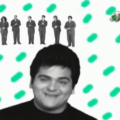|
|
|||||
| by Alex Britti | |||||
Una Su Un Milione |
One in a Million |
||||
| Accettami così | Accept me just like this | ||||
| ti prego non guardare | I beg you not to look | ||||
| nella mia testa | inside my head | ||||
| c’è un mondo da ignorare | there’s a world to ignore | ||||
| Voglio che tu sia | I want you to be | ||||
| mia complice discreta | My discreet accomplice | ||||
| Accettami e sarai la mia bambola di seta | Accept me and you’ll be my silken doll | ||||
| Acccettami e vedrai | Accept me and you’ll see | ||||
| andremo fino in fondo | that we’ll go on to the end | ||||
| Non pensare a cosa è giusto | Don’t think about what is right | ||||
| e cosa sta cambiando | and what is changing. | ||||
| Andiamo al polo nord | We’ll go to the North Pole | ||||
| o al sud se preferisci | or south, if you prefer | ||||
| Accettami ti prego | Accept me, I beg you, | ||||
| e dimmi che ci riesci | Tell me that you can. | ||||
| Non ho detto mai | I never said | ||||
| di essere perfetto | That I’m perfect | ||||
| Se vuoi ti aiuto io | If you want, I’ll help you | ||||
| a scoprire ogni mio difetto | To discover every defect I have | ||||
| Se ne trovi di più | If you find [even] more | ||||
| ancora mi sta bene | That’s still all right with me | ||||
| Basta che restiamo | Just as long as we stay | ||||
| ancora così insieme | Together like this still . | ||||
| Amo amo | I love, I love | ||||
| e’ qualcosa che si muove | it’s something that moves | ||||
| Su e giù per lo stomaco | up and down in my stomach | ||||
| più freddo della neve | colder than the snow | ||||
| Amo amo | I love, I love | ||||
| e’ un buco alla ciambella | It’s a hole in the donut | ||||
| La sua dolcezza effimera | Its ephemeral sweetness | ||||
| la rende così bella | Makes it so lovely . | ||||
| Accettami e vedrai | Accept me and you’ll see | ||||
| insieme cresceremo | Together we will grow | ||||
| Qualche metro in più | A few meters more | ||||
| e il cielo toccheremo | And touch the sky | ||||
| Più alti dei giganti | Taller than the giants | ||||
| più forti di godzilla | Stronger than Godzilla | ||||
| Faremo una crociera | We’ll go on a cruise | ||||
| su una nave tutta gialla | On a boat that’s all yellow | ||||
| Andremo su un’isola | We’ll go to an island | ||||
| che sembra disegnata | that looks drawn | ||||
| Con colori enormi | with enormous colors | ||||
| e un mare da sfilata | And a sea like a fashion show. | ||||
| Per quanto mi riguarda | As far as regards me, | ||||
| ho fatto già il biglietto | I’ve already got a ticket | ||||
| Ti prego non lasciarlo accanto | I beg you not to leave it alongside | ||||
| a un sogno nel cassetto | a dream in the drawer | ||||
| Amo amo | I love, I love | ||||
| e’ qualcosa di speciale | It’s something special | ||||
| Su e giù per lo stomaco | Up and down in my stomach | ||||
| è come un temporale | like a storm. | ||||
| Amo amo | I love, I love | ||||
| è il sugo sulla pasta | It’s the sauce on the pasta | ||||
| Finché non è finito | Until it’s finished | ||||
| non saprò mai dire basta | I’ll never know how to say “enough” | ||||
| Amo amo | I love, I love | ||||
| è un dono di natura | It’s a gift of nature | ||||
| Perché la nostra storia | Because our story | ||||
| non è solo un’avventura | Isn’t just an adventure | ||||
| Amo amo | I love, I love | ||||
| è una semplice canzone | It’s a simple song | ||||
| Serve a me per dirti | That serves me to tell you | ||||
| che sei una su un milione | That you’re one in a million. | ||||
Tag Archives: Italian language
Learn Italian in Song: Il Ragazzo della via Gluck
The Boy from Gluck StreetA supposedly autobiographical song by Adriano Celentano which may have been Italy’s first environmental protest song, presented at the San Remo music festival in 1966. Note: Via Gluck in Milan, like many Italian streets, is named for someone famous, in this case composer Christoph Gluck. The further you go from city center, the more obscure or modern the historical figures so honored.
|
|||
| Questa è la storia di uno di noi anche lui nato per caso in via Gluck | This is the story of one of us, he, too, born by chance in via Gluck | ||
| in una casa fuori città gente tranquilla che lavorava | in a house outside the city, tranquil people who worked | ||
| La dove c’era l’erba ora c’è una città | Where once there was grass now there’s a city | ||
| E quella casa in mezzo al verde ormai dove sarà | And that house in the midst of the green, where is it now? | ||
| Questo ragazzo della via Gluck si divertiva a giocare con me | This boy from via Gluck had fun playing with me | ||
| Ma un giorno disse "Vado in città" e lo diceva mentre piangeva | but one day he said "I’m going to the city," and he said it while he was crying | ||
| Io gli domando "Amico non sei contento? Vai finalmente a stare in città" | I asked him "Friend, aren’t you happy? Finally you’re going to live in the city | ||
| Là troverai le cose che non hai avuto qui; | There you’ll find the things you never had here | ||
| Potrai lavarti in casa senza andar giù nel cortile!" | You can wash in the house without going down in the courtyard!" | ||
| "Mio caro amico", disse "qui sono nato e in questa casa io lascio il mio cuore | "My dear friend," he said, "I was born here, and in this house I leave my heart. | ||
| Ma come fai a non capire è una fortuna per voi che restate | You can you not understand what good fortune it is for you who remain | ||
| A piedi nudi a giocare nei prati mentre là in centro respiro il cemento | Barefoot to play in the field while I downtown will breathe cement | ||
| Ma verrà un giorno che ritornerò ancora qui | But one day will come when I will come back here again | ||
| E sentirò l’amico treno che fischia così "wa wa!" | And I’ll hear my friend the train that whistles like this: "wa wa!" | ||
| Passano gli anni ma otto son lunghi però quel ragazzo ne ha fatto di strada | The years pass but eight are long, but that boy has gone a long way. | ||
| Ma non si scorda la sua prima casa ora coi soldi lui può comperarla | But he never forgets his first home, now with his money he can buy it | ||
| Torna e non trova gli amici che aveva solo case su case catrame e cemento | He returns and doesn’t find the friends he had, just houses upon houses, tar and cement | ||
| Lò dove c’era l’erba ora c’è una città | There where once was grass now there’s a city | ||
| E quella casa in mezzo al verde ormai, dove sarà? | And that city in the midst of the green, where is it now? | ||
| Eh no, non so, non so perché, | Hey, no, I don’t know, I don’t know why | ||
| perché continuano a costruire, le case | they keep building the houses | ||
| e non lasciano l’erba… | and don’t leave the grass | ||
| Eh no, se andiamo avanti così, chissà | Hey, no, if we keep on like this, who knows | ||
| come si farà, chissà… | How we’ll manage, who knows… | ||
Thinking Badly of Others in Italy
A very indicative Italian saying:
A pensare male si fa peccato, ma si indovina [quasi] sempre.
This translates roughly as: “To think badly [of others] is a sin – but you’re nearly always right.”
Italian for English Speakers – in 1611
Itlish: English Words in “Common” Use in Italian
Italian, like English and many others, accretes words from other languages. Often these are modern terms which have no easy equivalent in antique Latin or Greek roots.
For example: Ten years ago, Italians didn’t know how to refer to the process of scanning (a page, a photograph) using a scanner.
The correct word – digitalizzare (“digitalize”) – is unwieldy. An Italian speaker might instinctively invent a verb based on the foreign noun. But scannare already has a meaning in Italian: to slaughter! Which seems rather overkill for some poor, innocent document.
The compromise has been to use scannerizzare – “to scannerize”. Or else to say scannare with a wink, to acknowledge that the speaker knows that the usage is not correct.
clubs
There are lots of perfectly good words that one could use in Italian (associazione, circolo) for a group of people who gather to share a common interest, but for some reason the English “club” is also used.
However, for reasons which completely elude me, a short English u often ends up pronounced as eh by Italian speakers. Furthermore, English plurals are often abused by Italian speakers, being added or removed (with or without a superfluous apostrophe) without any consideration for real English usage. Hence the satirical music group Squallor could produce a song entitled Ti ho conosciuto in un clubs, where the final word is singular and is pronounced “clebs”.
stress
There is no good Italian equivalent for the modern use of “stress” in English. You could say sotto tensione to mean “under stress,” but stress is so commonly used that most people would now say sotto stress or stressato/a (stressed) and stressare (to make stressed, to cause stress).
handicap, handicappato
Usually pronounced without the initial h (there is no h in Italian) and, apparently, there is no native word for handicapped.











